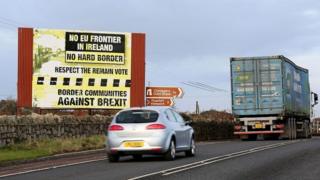 Image copyright
AFP
Image copyright
AFP
The EU has reportedly rejected the UK's solutions to avoid a hard border on the island of Ireland after Brexit.
The Daily Telegraph quoted unnamed sources suggesting British officials had been told on Wednesday that "none" of their proposed ideas would work.
The EU has said without a deal Northern Ireland must stay aligned with the Republic of Ireland in many areas of regulation - an outcome the UK opposes.
The UK said it had made its position clear and was continuing to "engage".
Britain is due to leave the European Union on on 29 March 2019.
The EU wants to present an agreed solution on the Irish border issue to an EU summit meeting in June.
Chief negotiator Michel Barnier told French TV on Friday that 25% of the final withdrawal deal had still to be settled and it could still be derailed by disagreements over the border and other issues.
The first-phase agreement reached in December - officially known as the Joint Report - contains the "backstop" option of continued North-South regulatory alignment in many areas.
The UK is strongly resisting this, as it believes this will effectively see Northern Ireland remain in the EU's customs union, which Theresa May is committed to leaving.
Three options
The UK hopes to avoid this outcome either by agreeing a very close economic partnership with the EU, which it believes would make physical checks on the Irish border unnecessary, or the use of technology to keep goods flowing freely as they do now.
The Telegraph said it had been told the UK's plans for Northern Ireland had been subject to a "systematic and forensic annihilation" at a meeting between senior EU officials and Oliver Robins, the UK's top Brexit official.
It quoted a source, who it said had been briefed on the meeting, as saying the UK was informed that "none of the UK's customs options will work" in what it said was a "detailed and forensic rebuttal".
The paper also claimed that the UK was told it would have to ensure "full compliance" with EU rules on goods and agricultural products if it wanted to prevent customs barriers.
The BBC understands British officials do not take the same view of the meeting and point out that the EU has long been sceptical about the UK's position.
A government spokesman said it was committed to avoiding a hard border but also protecting Northern Ireland's constitutional and economic position within the UK.
"We have made our position on aspects of the draft Commission protocol clear," he said.
"We have agreed that the areas covered by the draft must reflect those that meet our shared commitments.
"We are continuing an intensive work programme to engage on all the scenarios set out in the Joint Report."
'Fantasy model'
The UK's former top official in Brussels, Sir Ivan Rogers, said he believed the European Commission and many EU states, in particular the Republic of Ireland, believed the "backstop" option was the only viable solution.
Speaking in London on Thursday, he suggested proposed economic solutions for avoiding a hard border were regarded as a non-starter because of the UK's decision to diverge from the EU by leaving the single market.
"The Brits are therefore focused above all on option B - the technological solution. That, candidly, from everything I've heard from various places is still viewed as a bit of a fantasy island unicorn model".
Lack of progress on the issue would increase domestic pressure on Theresa May, who is facing growing calls within Parliament for the UK to remain in the EU's customs union - which ensures no internal tariffs between its members but prevents states from negotiating their own trade deals with other countries.
MPs are pushing for a vote in the Commons next week on remaining in some form of customs union after the government was defeated on the issue in the Lords on Wednesday.
The BBC has been told that political uncertainty in the UK, and the prospect that Parliament could force a change in UK customs policy, may be strengthening the EU's resolve not to budge on the issue at the moment.